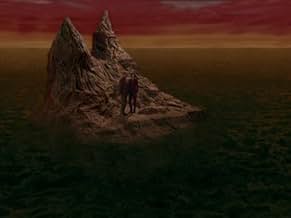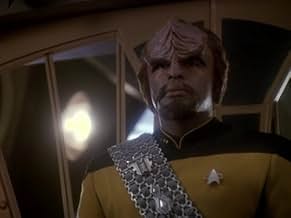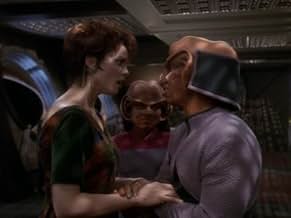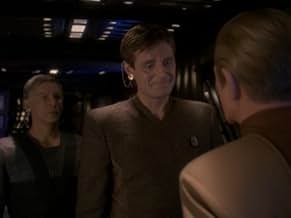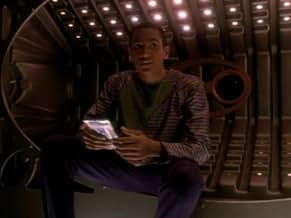In the vicinity of the liberated planet of Bajor, the Federation space station Deep Space Nine guards the opening of a stable wormhole to the far side of the galaxy.In the vicinity of the liberated planet of Bajor, the Federation space station Deep Space Nine guards the opening of a stable wormhole to the far side of the galaxy.In the vicinity of the liberated planet of Bajor, the Federation space station Deep Space Nine guards the opening of a stable wormhole to the far side of the galaxy.
- Won 4 Primetime Emmys
- 59 wins & 116 nominations total
Browse episodes
Featured reviews
This is easily the best of all the Star Trek series. The characters are likable, and develop well over time. Of course it helps that many of the characters are warm and funny and very well fleshed out. Quark is a favourite of mine, always funny and well acted. The story itself is great, and really picks up in season 4. Having a plot that develops throughout rather than just stand-alone stories like many of the Next Generation episodes helps it a lot. The Religion v Science aspects are an interesting addition to a science-fiction show. Ideas created in TNG are carried forward and developed, such as the Trills, while in TNG they simply move their personality to a new body in this the idea is taken further and the personalities are merged, making the race much more interesting. One of the great aspects of the show is the relationships between the characters. O'Brian and Julian seem like genuine friends, Odo and Quark and their rivalry, and the on going feud of Sisko and Gul Dukat, the two commanders of the Station. The series created some genuinely good characters. Sisko, the Federation Officer torn between duty and destiny. Garak, the traitor with decidedly dark past, and Gul Dukat, a truly great villain. The series succeeds with a grand plot, paints a wider picture of the Star Trek Universe, and would make for some great feature films.
I won't say much about "Deep Space Nine" other than that it is the most well written, off-beat, and truly suspenseful of the Star Trek series. It is the series for everyone else... those who don't enjoy happy Star Trek (ie- "Next Generation), weird Star Trek (ie- "The Original"), or dumb Star Trek (ie- "Voyager").
It has a much darker tone, with a story-line that, if anyone watched from the beginning of the story arc to what is on currently, could understand and enjoy. It doesn't have the traditional "We are the Champions and can solve any problem in an hour". It features low-life, people making mistakes in judgement, conflicts over spirituality, and a much more human and less superficial look at one of pop culture's little universes. It features war-torn individuals and petty conflicts over land. Problems with culture-clash, government conspiracy and corruption, etc... This list could go on and on.
The main thing that makes "Deep Space Nine" different is that it is a Star Trek series for folks who don't want a lot of technobabble (not that there isn't any) Star Trek, where problems just go away or perfect people on a perfect ship that always win. It makes it more interesting for the watcher, almost like reading a novel. Most people, especially non-Trek fans, who had watched the series from its conception or joined when the story arc began about 4 years ago will know what I mean when I say this is an untraditional type of Star Trek. And those who haven't, try it. It's definitely a move away from the stereotype most folks have about the Star Trek series (though of the other Star Treks, I can't say the same.)
It has a much darker tone, with a story-line that, if anyone watched from the beginning of the story arc to what is on currently, could understand and enjoy. It doesn't have the traditional "We are the Champions and can solve any problem in an hour". It features low-life, people making mistakes in judgement, conflicts over spirituality, and a much more human and less superficial look at one of pop culture's little universes. It features war-torn individuals and petty conflicts over land. Problems with culture-clash, government conspiracy and corruption, etc... This list could go on and on.
The main thing that makes "Deep Space Nine" different is that it is a Star Trek series for folks who don't want a lot of technobabble (not that there isn't any) Star Trek, where problems just go away or perfect people on a perfect ship that always win. It makes it more interesting for the watcher, almost like reading a novel. Most people, especially non-Trek fans, who had watched the series from its conception or joined when the story arc began about 4 years ago will know what I mean when I say this is an untraditional type of Star Trek. And those who haven't, try it. It's definitely a move away from the stereotype most folks have about the Star Trek series (though of the other Star Treks, I can't say the same.)
Before Deep Space Nine aired back in 1993 I felt quite a bit of apprehension. How could they have a Star Trek series without a ship going off exploring? I wasn't going to watch it but being a fan Star Trek and Star Trek:The Next Generation I had to watch it.
I was pleasantly surprised by Deep Space Nine. The stories were fantastic. The writers were very imaginative-they had to be. There was no jetting off in starships from planet to planet. Everything was set on Deep Space Nine which made for more interesting storylines. And storylines continued throughout the season. Deep Space Nine was not like most sci-fi shows where starships leave a planet at the end of the episode and jet off to their next adventure. Instead, all the action came to Deep Space Nine instead.
The characters were good too and not all of them were buddies with each other. Avery Brooks made a good Commander and the talented Nana Visitor did a good job playing Kira. Two other memorable characters were the mysterious Odo and the slimy Quark.
If anyone wants to watch a thought provoking show without seeing starships jetting off from galaxy to galaxy then this is the show for you.
I was pleasantly surprised by Deep Space Nine. The stories were fantastic. The writers were very imaginative-they had to be. There was no jetting off in starships from planet to planet. Everything was set on Deep Space Nine which made for more interesting storylines. And storylines continued throughout the season. Deep Space Nine was not like most sci-fi shows where starships leave a planet at the end of the episode and jet off to their next adventure. Instead, all the action came to Deep Space Nine instead.
The characters were good too and not all of them were buddies with each other. Avery Brooks made a good Commander and the talented Nana Visitor did a good job playing Kira. Two other memorable characters were the mysterious Odo and the slimy Quark.
If anyone wants to watch a thought provoking show without seeing starships jetting off from galaxy to galaxy then this is the show for you.
Disappointed by all those new shows and movies "re-imagining" the Star Trek-universe I put Deep Space Nine on my plate again: and what a relieve it is! Every time I watch one of those "old" Star Trek shows and movies I realize once again how bad (besides the work of the special effects department) the new ones are. DNS got everything I liked and still like about the good old ST-universe: interesting and charming character- and world-building, fine stories with sub- and "ueber"-plots. This is how Star Trek should be, everything else is nothing but bad ideas and bad composed scripts disguised by an overkill of special effects and action. Deep Space Nine - like a good wine grows stronger and tastes better with every decade past by.
10mstomaso
DS9 is one of my all-time favorite television shows. It edges out Star Trek's original series just barely as my favorite in the franchise. I am not going to state that it's the best Star Trek series, because it definitely will not appeal to everybody, but it is my favorite.
DS9 deviates from the Trek franchise formula in an important way - it is based on one location - a Cardassian-built space station near the planet Bejor. So even the architecture of the main set is alien - not another sterile militaristic star ship inhabited by a primarily white European crew - but a true Babel. Bejor has just been liberated from 60 years of occupation by an expansionist militaristic race - the Cardassians. Both Bejorans and Cardassians will play important roles throughout DS9. Since the station does not move much during the show's seven year run, DS9 has a much stronger sense of place than the other ST series, and is able to develop story arc and character continuity much more powerfully than the others.
All of the major characters and most of the frequent returning characters have their own interwoven story arcs - most of which span the entire series. Ben Sisko (Avery Brooks), the station's commander, is a somewhat disgruntled Star Fleet officer who has several personal vendettas which have almost driven him from Star Fleet. He is also a single parent and a genius. In the very first episode, Sisko's arc begins and it is clear that his story will be the frame within which the entire series is organized - though the reasons for this will no become entirely clear until near the end. Also memorable are the gruff, shape-shifting Chief Constable Odo(Rene Auberjunois) who does not know what he is and where he came from; Kira (Nana Visitor) Sisko's aggressive and intense Bajoran second officer; Garak (Andy Robinson) a Cardassian Tailor and - possibly - spy, who is easily the most well-developed, well-acted and interesting recurring guest star Star Trek has ever had; Jadzia Dax (Terry Farrell) - the beautiful Trill science officer whose consciousness is enhanced by the memories and personality of a 600 year old symbiotic slug who lives in her stomach and has inhabited dozens of previous hosts; Julian Bashir (Alex Siddig) - the station's young, brilliant, adventurous and naive doctor; and Quark (Armin Shimmerman), the greedy, conniving, but entirely lovable Ferengi casino owner.
The characters, cast, and serialized stories make DS9 stand apart from the franchise as the most powerfully plotted, intensely dramatic and politically charged Star Trek ever. The show is, however, not for those with limited attention spans and a disdain for complexity. While it isn't exactly hard to follow, the dialog is often dense and DS9 - more than any other Trek show - uses non-verbal communication very well. Brooks, Visitor and Robinson - all of whom are masters at this - are particularly non-verbal and make a big impression from the first few episodes.
Throughout the series, there are constant underlying political intrigues and surprisingly little filler. Almost every story connects with the main story arc (Sisko's and Bejor's) in one way or another, and no time is wasted with aimless experimentation by the writing team (a problem Voyager and Enterprise both suffered from).
The production is consistently theatrical in scope. The special effects are still - even today - above average for television, and even the new BSG doesn't approach the scope and coherence of the plot.
Highly recommended for bright people looking for something more than typical TV drama normally delivers.
DS9 deviates from the Trek franchise formula in an important way - it is based on one location - a Cardassian-built space station near the planet Bejor. So even the architecture of the main set is alien - not another sterile militaristic star ship inhabited by a primarily white European crew - but a true Babel. Bejor has just been liberated from 60 years of occupation by an expansionist militaristic race - the Cardassians. Both Bejorans and Cardassians will play important roles throughout DS9. Since the station does not move much during the show's seven year run, DS9 has a much stronger sense of place than the other ST series, and is able to develop story arc and character continuity much more powerfully than the others.
All of the major characters and most of the frequent returning characters have their own interwoven story arcs - most of which span the entire series. Ben Sisko (Avery Brooks), the station's commander, is a somewhat disgruntled Star Fleet officer who has several personal vendettas which have almost driven him from Star Fleet. He is also a single parent and a genius. In the very first episode, Sisko's arc begins and it is clear that his story will be the frame within which the entire series is organized - though the reasons for this will no become entirely clear until near the end. Also memorable are the gruff, shape-shifting Chief Constable Odo(Rene Auberjunois) who does not know what he is and where he came from; Kira (Nana Visitor) Sisko's aggressive and intense Bajoran second officer; Garak (Andy Robinson) a Cardassian Tailor and - possibly - spy, who is easily the most well-developed, well-acted and interesting recurring guest star Star Trek has ever had; Jadzia Dax (Terry Farrell) - the beautiful Trill science officer whose consciousness is enhanced by the memories and personality of a 600 year old symbiotic slug who lives in her stomach and has inhabited dozens of previous hosts; Julian Bashir (Alex Siddig) - the station's young, brilliant, adventurous and naive doctor; and Quark (Armin Shimmerman), the greedy, conniving, but entirely lovable Ferengi casino owner.
The characters, cast, and serialized stories make DS9 stand apart from the franchise as the most powerfully plotted, intensely dramatic and politically charged Star Trek ever. The show is, however, not for those with limited attention spans and a disdain for complexity. While it isn't exactly hard to follow, the dialog is often dense and DS9 - more than any other Trek show - uses non-verbal communication very well. Brooks, Visitor and Robinson - all of whom are masters at this - are particularly non-verbal and make a big impression from the first few episodes.
Throughout the series, there are constant underlying political intrigues and surprisingly little filler. Almost every story connects with the main story arc (Sisko's and Bejor's) in one way or another, and no time is wasted with aimless experimentation by the writing team (a problem Voyager and Enterprise both suffered from).
The production is consistently theatrical in scope. The special effects are still - even today - above average for television, and even the new BSG doesn't approach the scope and coherence of the plot.
Highly recommended for bright people looking for something more than typical TV drama normally delivers.
Stellar Photos From the "Star Trek" TV Universe
Stellar Photos From the "Star Trek" TV Universe
We've rounded up some of our favorite photos from across the "Star Trek" TV universe. Take a look at memorable moments from red carpet premieres and classic episodes.
Did you know
- TriviaKira was a last-minute addition to the cast. The original plan was to include the Star Trek: La nouvelle génération (1987) character of Ro Laren, but Michelle Forbes didn't want to do a series at the time.
- GoofsIn the first three seasons, CDR Sisko refers to his father in the past tense, even talking about his slow demise and death from some unknown ailment. But starting in the fourth season ("Homefront"), Joseph Sisko is alive and well running a restaurant in New Orleans. Joseph appears in a total of six episodes throughout the last 4 seasons.
- Crazy creditsThe opening credits for "Emissary" lacked the wormhole opening that all future episodes featured. Starting with Season 4, the opening credits included additional spacecraft and activity around the station, including the Defiant flying into the wormhole.
- Alternate versionsSeveral episodes were originally shown as 2-hour movies. They were later edited into two-part 60 minute episodes for later airings.
- ConnectionsEdited into Star Trek: Voyager: Unity (1997)
- SoundtracksStar Trek: Deep Space Nine - Main Title
Written by Dennis McCarthy
Details
- Release date
- Country of origin
- Official sites
- Languages
- Also known as
- Deep Space Nine
- Filming locations
- Production company
- See more company credits at IMDbPro
Contribute to this page
Suggest an edit or add missing content



